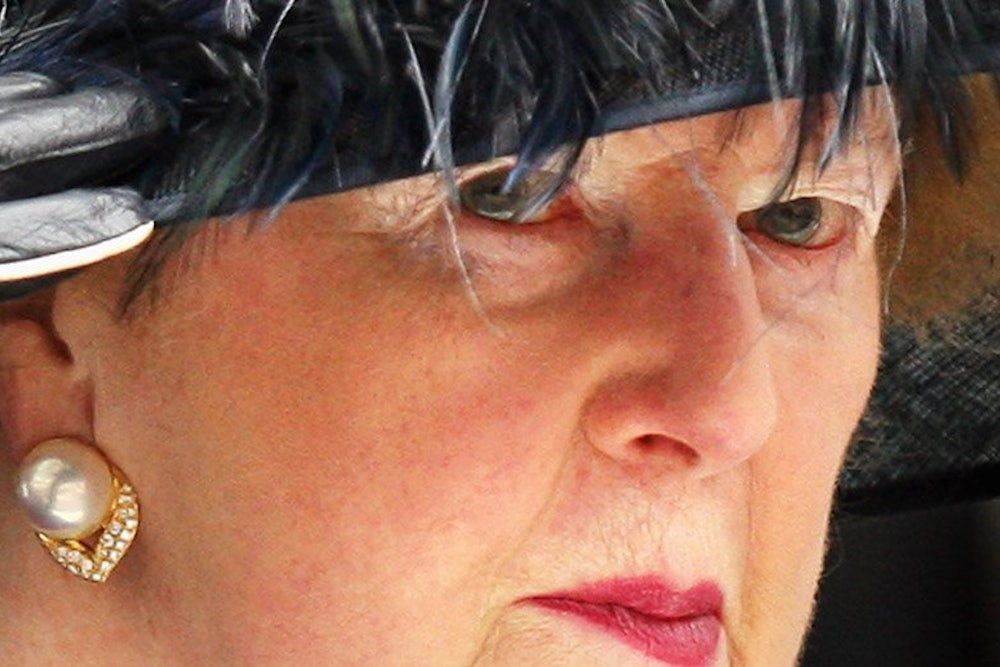The hit of the London stage these days, a play called This House, is set during the grimmest period of postwar British politics, when the humbled former empire fell to its knees in the late-’70s, hobbled by strikes, economic decline, power shortages—even dear old Big Ben stopped ticking. As the punk soundtrack recalls, these were years of anarchy in the U.K.; the country creaked toward calamity. Most lines in This House—set in the House of Commons from 1974–79—belong to the shabby parliamentary whips responsible either for cobbling together a minority government (the Labour Party) or undermining it (the Conservatives). But the real star of the play is an up-and-coming politician, Maggie Thatcher, although no such character ever appears onstage.
When the drama ends, it is with the collapse of the Labour government and the election in 1979 of a Conservative majority. Before the curtain falls, the new prime minister speaks via a recording, intoning with the nasal insistence that became so familiar during the eleven years of her governance that followed.
All this is old news, so why is the play a smash-hit now? Some critics cite parallels to the contemporary nation: the economic doldrums, laments over “Broken Britain,” aggressive cuts by a Tory government. Yet this time is nothing like old times. Not only because the social strife isn’t as acute, but because few would mistake Prime Minister David Cameron for a forceful leader. The play—and the Iron Lady herself—loom large today because of the lasting effect her rule has had on this country. Leftists of a certain age still despise her with spitting passion, but they never deny her impact.
As This House reminds us, her rise was remarkable given the attitudes of the period. In the 1970s, professional men still shamelessly patronized their female counterparts, condemning them to one of two categories, akin to those in the chortling fiction of P.G. Wodehouse: Ladies were either objects of adoration or bothersome aunts. This lady, however, was iron.
How Margaret Thatcher characterized herself was as an effervescent tonic for a country lacking fizz. And she represented an incremental shift in class barriers—a grocer’s daughter with an accent plummy enough for old-school Tories. Her toil-deserves-riches ethic, boosted by sympathetic coverage in mass-market tabloids, attracted working-class supporters who previously had been guaranteed Labour voters. And her bulldog grit in defying those who challenged British order—from the IRA, to striking miners, to an Argentine junta that claimed one of the last surviving colonies—reasserted national pride while shouldering the nation rightward.
Her most famous chum on the right, President Reagan, is nowadays remembered for presiding over triumph in the cold war. But Thatcher’s most memorable battle was domestic: a campaign against the existing tenets of the state, questioning the entire existence of a “society” that united individuals, slashing tax rates, privatizing, crushing trade unions, and so on. The layoffs and clashes of those times still resonate in the United Kingdom, especially in northern cities that had subsisted off heavy industry since the Industrial Revolution, only to find themselves bereft, battered, and jobless during the Thatcher years.
But Thatcher won her war devastatingly, wiping out the other side. When the Labour Party returned to power 18 years after her first government, it had utterly remade itself. “New Labour” acted more like a centrist party, less connected with the labor movement whence its name derived, more tied to the financiers once deemed class enemies.
Supposedly, Thatcher said that Tony Blair was her greatest achievement. And while some Labour figures expressed ambivalence Monday in discussing her legacy, the former prime minister sounded a more admiring tone, acknowledging his government’s debt to her policies. “Very few leaders get to change not only the political landscape of their country but of the world. Margaret was such a leader,” Blair said. The current leader of the Labour Party, Ed Miliband, added: “She will be remembered as a unique figure. She reshaped the politics of a whole generation.”
Less sympathetic observers blame Thatcher for unleashing a money-hungry culture that led to the rapacious bankers and the crash. When John Lanchester wrote a state-of-the-nation novel last year, he named it Capital, not just because the setting was London but because the economic meaning of “capital” summed up the national orientation around its financial sector.
So, how will Thatcher be seen once the politesse following her death recedes? The bestselling T-shirt on one website Monday bore the slogan “Still Hate Thatcher.” Yet her reputation may well rise in years to come. Early signs of this ascendance were already evident in 2011, with the largely sympathetic portrayal in The Iron Lady, the biopic starring Meryl Streep as the aging Thatcher.
Nowadays, Britons grumble about the current crop of politicians, about cuts, about life in general. But few reminisce about the dreary lows of the ’70s preceding her first government. Thatcher believed that, to transform a country in decline, her ends justified the means. Today, her ends are what Britain is left with; the painful means remain in memory, but they dim annually.
The British of today, proudly or dejectedly, remain children of Mrs. Thatcher, even now that she has left the stage.
